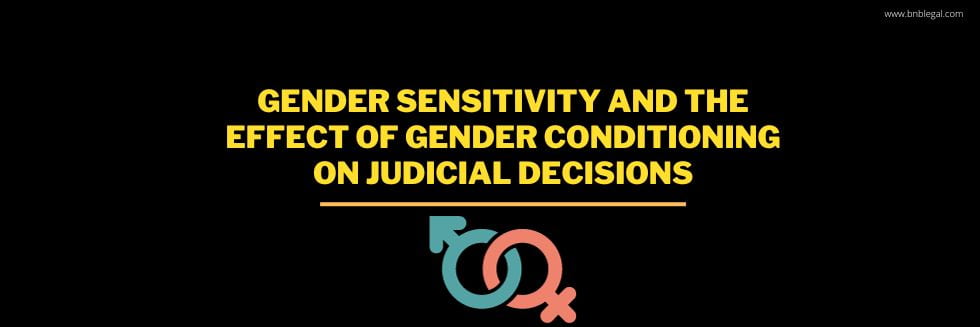Abstract
Judicial decisions form the basis of our constitutional morality, equality, and justice. The judiciary being the watchdog of our Constitution is responsible for protecting the fundamental rights of our citizens and providing them protection guaranteed under our Constitution. Judicial decisions in the last few decades have been centered more around establishing the idea of “equality,” “equal representation” and “equal protection” of citizens bringing the concept of gender sensitization to the forefront of the issues prevailing in the country.
In a developing country like India where the roles of men and women are socially categorized and more complex with the inclusion of culture, religion, and status, it becomes a more sensitive issue to deal with the offences happening against them and the treatment of such offences by the judicial courts. The law in India has been centred more around the concept of the “protection of rights of women” since the enactment of our Constitution but the concept of newly developed concept of “substantive equality” aims majorly at limiting the repressive approach, removing the stigma around the victim in sexual offences and taking a gender-sensitive interpretation of the word “consent.”
The judges need to be more receptive to the facts and circumstances of the cases rather than creating societal standards of morality and behaviour in such offences. This article discusses the concept of gender sensitivity and examples of the effects of gender conditioning on judicial decisions related to sexual offences.
Introduction
Gender sensitivity in today’s scenario plays a very important role in interpreting the laws keeping in view the social position of women and the effect of these decisions on society at large. The concept of gender sensitization is the acknowledgement of gender differences, and inequality among genders and not considering them in a group of the “inferior sex.” This becomes a difficult part of a society that is inherently patriarchal in nature, establishing the superiority of men over women. Sexual offences against women which are generally categorized as offences against society as a whole have started with “gender conditioning” of people in a set-up that has seen women in a comparatively detrimental position as compared to men. Sexual offences can be seen as examples of men trying to establish their power and control over women by allegedly putting them “in their place.” The impact of sexual offences on women tends to leave physical as well as psychological scars and societal trauma. The judiciary in this scenario is expected to take more of an individualistic approach sensitive to the mental and psychological health of the survivor and more sensitive in its dealings with such cases.
Attempts to reform rape laws, for example, have tended to build on the model of the deviant rape laws, for example, have tended to build on the model of the deviant perpetrator and the violent act, as if the fact that rape is against society as a whole. Initiatives are directed for the judges to be more receptive, the prosecutors more responsive, and the law to be less sexist. The unaddressed issues and the lack of confrontation are the reasons why women are raped more. The lack of knowledge of seeing the other gender as an individual and the basic norm of masculine nature to be based on objectification in a patriarchal set-up existing right from the basic family system is where lies the problem in promoting gender sensitization. The individual, for example, against whom an offence has been committed is not the victim but a survivor.
Various steps have been taken by the government and the education system to promote and educate the children about ‘gender sensitization” right from their learning years and by bringing it right into the education system. The government has enacted various laws to prevent the exploitation of women and children in the social and workplace domains. This is done to increase the educational, social, and political participation of women.
- The Criminal Law Amendment Act, of 2013 was enacted to make the rape laws stricter, the procedure faster and the punishment more stringent.
- Prevention of Women from Domestic Violence Act, 2005
- The Sexual Harassment of Women at Workplace (Prevention, Prohibition and Redressal) Act, 2013
- The Right of Children to Free and Compulsory Education Act, 2009
- The Dowry Prohibition Act, 1961
- The Prohibition of Child Marriage Act, 2006
- The Equal Remuneration Act, 1976
- The Maternity Benefit (Amendment) Act, 2017
- Immoral Traffic (Prevention) Act, 1956
All the above enactments are enacted with the intention of the legislature to provide a “safe working environment to women”, “provide them with a remedy in case of violence” against them, and give them the compulsory “right to education.” There have been many gender-sensitive and progressive judgments in the previous years, however, we also have some regressive views and gender-insensitive decisions which again makes us think about the effect of gender conditioning in our society as a whole. The lack of a female perspective and the inclusion of more female judges is the need of the hour in the judiciary for equal representation.
Effects Of Gender Conditioning On Judicial Decisions By Examples
The sexist remarks towards rape victims form yet another plethora of insensitivity related to sexual offences where “victim shaming” forms a huge part of the trial. The stereotyping of rape victims based on preconceived ideas has echoed in most of the testimonies during the trial process. The concept of “consent” and how women should react during rape forms the basis of grounds on which the charges should be made against the accused. In some cases, it is shocking to notice that marriage is still considered a way of redressal for rape. Here are some examples where the judiciary has taken a regressive approach and somewhere the judiciary has been sensitive towards the offence taking place against the woman.
The Supreme Court in the case of Tukaram and Anr. Vs State of Maharashtra acquitted the accused police officer, stating that the victim, was “a shocking liar” whose testimony “is riddled with falsehood and improbabilities.” The Court further claimed that there is a world of difference between sexual intercourse and rape. The minor victim was subject to character assassination, stating that she had sexual intercourse with one of the accused of her free will and that the police officer had groped her because she was “habituated to sexual intercourse.” Further, as there was no injury on the girl’s body, it could not be deduced whether the girl had been subjected to or was under any fear or compulsion. Instead, the court believed that such an act would justify an inference of “passive submission”.
The High Court in the case of Mohit Subhash Chavan v. State of Maharashtra, 2021 condemned the orders of the Additional Sessions Judge in which he granted anticipatory bail to the government employee as atrocious. It was held by the court that the minor girl had sufficient maturity about the incident that happened to her and this could be seen with her using a contraceptive. The approach of the learned Judge from such reasoning clearly shows his utter lack of sensitivity in such serious matters. Despite having noted that the applicant was still a minor when the accused had sexually exploited her and despite observing that her consent would be immaterial, he has concluded that it was a consensual relationship.
In Sri Rakesh B VS State of Karnataka, the Court granted bail to the accused on the grounds stating that “nothing is mentioned by the complainant as to why she went to her office at night i.e.., 11.00 p.m.; she has also not objected to consuming drinks with the petitioner and allowing him to stay with her till morning; the explanation offered by the complainant that after the perpetration of the act, she was tired and fell asleep, is unbecoming of an Indian woman; that is not the way our women react when they are ravished.”
A More Progressive And Sensitive Approach
In Dilip vs. State of Madhya Pradesh, the Hon’ble Supreme Court taking a progressive approach directed that trial Courts should show sensitivity while trying cases of sexual assault. A victim of sexual assault requires a different kind of treatment not only from society but also from the State authorities. Before parting with the case, the Supreme Court expressed their anguish about the prosecution which could have been more careful and the trial Court could have shown more sensitivity towards the case considering its facts and circumstances.
In Delhi, Domestic Working Women’s Forum v. Union of India & Ors., the Supreme Court found that in the cases of rape, the investigating agency, as well as the Subordinate courts, sometimes adopt totally an indifferent attitude towards the prosecutrix x and therefore, court issued the following directions to assist the victims of rape:
- The complainants of sexual assault cases should be provided with legal representation. It is important to have someone who is well acquainted with the criminal justice system. The role of the victim’s advocate would not only be to explain to the victim the nature of the proceedings, to prepare her for the case, and to assist her in the police station and court but to provide her with guidance as to how she might obtain the help of a different nature from other agencies, for example, mind counselling or medical assistance. It is important to secure continuity of assistance by ensuring that the same person who looked after the complainant’s interests in the police station represents her till the end of the case.
- Legal assistance will have to be provided at the police station since the victim of sexual assault might very well be in a distressed state upon arrival at the police station, The guidance and support of a lawyer at this stage and whilst she was being questioned would be of great assistance to her.
- The police should be under a duty to inform the victim of her right to representation before any questions were asked of her and the police report should state that the victim was so informed.
- A list of advocates willing to act in these cases should be kept at the police station for victims who did not have a particular lawyer in mind or whose own lawyer was unavailable.
- The advocate shall be appointed by the court, upon application by the police at the earliest convenient moment, but to ensure that victims were questioned without undue delay, advocates would be authorized to act at the police station before leave of the court was sought or obtained.
- In all rape trials anonymity of the victim must be maintained, as far as necessary.
- It is necessary, having regard to the Directive Principles contained under Article 38(1) of the Constitution of India to set up a Criminal Injuries Compensation Board. Rape victims frequently incur substantial financial loss. Some, for example, are too traumatized to continue in employment.
- Compensation for victims shall be awarded by the court on conviction of the offender and by the Criminal Injuries Compensation Board whether or not a conviction has taken place. The Board will consider pain, suffering, and shock as well as loss of earnings due to pregnancy and the expenses of childbirth if this occurred as a result of the rape.”
Conclusion
In conclusion, it can be said that we have seen a considerable effect of gender conditioning in the judgments of the courts in cases of sexual offences but the more mature and progressive view cannot be completely ignored which somehow has established “women” and “men” as more individualistic in nature rather than attaching their roles set by society. Gender sensitization and equality go together as it is a way of establishing the norm of “substantial equality” rather than just being a formal approach. The changing position of women and the concept of gender sensitivity for both men and women are gradually but effectively changing the course of action, however, more steps need to be taken in that direction. Representation of more female judges in cases related to sexual offences, stronger representation of women politically and socially, and breaking the stereotype of an “ideal” woman are what need to be dealt with in 2023.
This article is written and submitted by Sakshi during her course of internship at B&B Associates LLP. Sakshi is a 4th year B.A. LL.B. (Hons.) student at Dr. BR Ambedkar National Law University, Sonipat.






